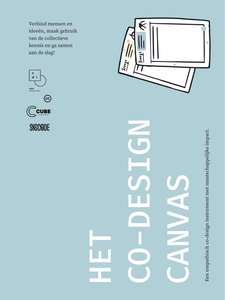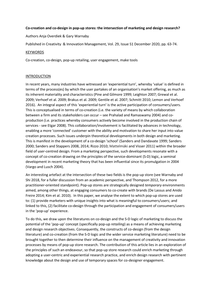Het lectoraat Co-Design van Hogeschool Utrecht doet met een systemisch-inclusieve ontwerpende aanpak praktijkgericht onderzoek, om complexe maatschappelijke vraagstukken te helpen oplossen. Binnen die onderzoeken stellen we vragen over het ontwerpproces en de mensen die daarbij betrokken zijn. Hoe kun je goed co-designen in de weerbarstige werkelijkheid? Wat kan helpen in die ontwerpende aanpak? Hoe kunnen mensen die niet zijn opgeleid als ontwerpers volwaardig meedoen in het ontwerpproces, en wat hebben zij daarvoor nodig aan ontwerpend vermogen? De kennis over ontwerpend vermogen die we de afgelopen vier jaar hebben opgedaan, delen we in dit boekje. We hebben dat proces getekend en beschreven als een reisverhaal van Co, die ons meeneemt op een boot over een rivier, door stroomversnellingen en langs landschappen. Met bijdragen van: Marry Bassa, Anita Cremers, Tanja Enninga, Anita van Essen, Christa van Gessel, Berit Godfroij, Joep Kuijper, Remko van der Lugt, Caroline Maessen, Lenny van Onselen, Dirk Ploos van Amstel, Karlijn van Ramshorst, Carolijn Schrijver, Fenne Verhoeven, Danielle Vossebeld, Rosa de Vries
DOCUMENT

Het Co-Design Canvas is een instrument om samenwerkingen rondom maatschappelijke uitdagingen met verschillende betrokkenen open en transparant te starten, plannen, uitvoeren en evalueren. Het biedt een hulpmiddel aan overheden, burgers, bedrijven, non-profitorganisaties, kennisinstellingen en andere belanghebbenden om helder te kunnen communiceren en samenwerken. Het maakt verschillen in belangen, kennis, ervaring en machtsverhoudingen inzichtelijk, staat vanaf het begin stil bij gewenste positieve impact en concrete resultaten en zorgt ervoor dat ieders stem echt gehoord wordt.
MULTIFILE

Het doen van co-design en co-research samen met de mensen in het betreffende maatschappelijk domein kan veel beweging in gang zetten. Het is zaak om ook juist deze functie van applied design research als ‘key enabling methodology’ verder te ontwikkelen, evenals een repertoire van cases te verzamelen om uit te kunnen putten.
DOCUMENT
The numerous grand challenges around us demand new approaches to build alternative sustainable futures collectively. Whereas these so-called co-design processes are becoming more mainstream, many multi-stakeholder coalitions lack practical guidance in these dynamic and systemic challenges based on entangled relationships, interactions, and experiences between stakeholders and their environments. Although scholars and practitioners convey a lot of co-design theories and methods, there does not seem to be a practical instrument beyond methods that supports new coalitions with an overview of a co-design process to come and in making shared and fundamental co-design decisions. Therefore, this paper proposes the empathic Co-Design Canvas as a new intermediate-level knowledge product existing of eight co-design decision cards, which together make up the Canvas as a whole. The Canvas is based on an existing theoretical framework defined by Lee et al. (2018), an empirical case study, and a diversity of experiences in education and practice. It aims at supporting multi-stakeholder coalitions to flexibly plan, conduct, and evaluate a co-design process. Moreover, the Canvas encourages coalitions to not only discuss the problematic context, a common purpose, envisioned impact, concrete results, and each other’s interests and knowledge, but also power, which can create trust, a more equal level playing field and empathy, and help manage expectations, which is greatly needed to overcome today’s grand challenges.
LINK
Creatieve onderzoeksmethoden in de zorg zijn veranderd door de komst van COVID-19. Bij (het ontwerpen van) innovaties moet steeds gekeken worden of en hoe deze in de praktijk toegepast kunnen worden. Een nieuwe situatie zorgt voor nieuwe kansen, maar vraagt aan de andere kant ook om een verandering in de manier van werken. Al decennialang duikt in moeilijke tijden de uitspraak “Never let a good crisis go to waste” op. Zo ook nu, nu de huidige crisis nieuwe kansen biedt voor het ontwerpen voor en met de zorg.
DOCUMENT

During the Dutch Design Week 2020 (DDW2020), researchers of the project ‘Creative & Health Innovation Ways of Working Analysis’ (CHIWaWA) organized together with UCreate an online session on "Co-design in the 1.5 meter society", as part of the program "Embassy of Health" (World Design Embassies). In this online session, five guest speakers presented a case on how COVID-19 has changed the co-design approach in research and design projects. Three cases are Dutch projects in creative industry, and two are research projects from Eindhoven University of Technology.
DOCUMENT

Our society faces many challenges, necessitating collaborative efforts among multiple stakeholders. Our students learn this in living labs. This paper explores preliminary research on introducing co-design to novices. We introduce a case study exploring how design educators can support students in developing co-design competencies. Central to this study is our Co-Design Canvas, introduced as a pivotal tool for fostering open dialogue among diverse stakeholders. This stimulates collaboration through effective teamwork and empathic formation. The research questions aim to discover effective methods for introducing the Co-Design Canvas to living lab students, and to identify the necessary prior knowledge and expertise for both novices and educators to effectively engage with and teach the Co-Design Canvas. The paper advocates for a pedagogical shift to effectively engage students in multi-stakeholder challenges. Through a series of workshops, the Co-Design Canvas was introduced to novices. We found that this required a significant cognitive stretch for staff and students. The paper concludes by presenting a, for now, final workshop format consisting of assignments that supports introducing the Canvas and thereby co design to societal impact design novices. This program better prepares students and coaches for multi stakeholder challenges within living labs.
MULTIFILE

Co-creation as a concept and process has been prominent in both marketing and design research over the past ten years. Referring respectively to the active collaboration of firms with their stakeholders in value creation, or to the participation of design users in the design research process, there has arguably been little common discourse between these academic disciplines. This article seeks to redress this deficiency by connecting marketing and design research together—and particularly the concepts of co-creation and co-design—to advance theory and broaden the scope of applied research into the topic. It does this by elaborating the notion of the pop-up store as temporary place of consumer/user engagement, to build common ground for theory and experimentation in terms of allowing marketers insight into what is meaningful to consumers and in terms of facilitating co-design. The article describes two case studies, which outline how this can occur and concludes by proposing principles and an agenda for future marketing/design pop-up research. This is the peer reviewed version of the following article: Overdiek A. & Warnaby G. (2020), "Co-creation and co-design in pop-up stores: the intersection of marketing and design research?", Creativity & Innovation Management, Vol. 29, Issue S1, pp. 63-74, which has been published in final form at https://doi.org/10.1111/caim.12373. This article may be used for non-commercial purposes in accordance with Wiley Terms and Conditions for Use of Self-Archived Versions. LinkedIn: https://nl.linkedin.com/in/overdiek12345
MULTIFILE

Collaborative approaches to destination design require conscious and reflexive stakeholder involvement in activities and decision making. Design science studies such participatory processes by observing design teams in practice. From these observations, scientists have identified design strategies and processes that design teams use to support their work in identifying problems and developing solutions. Observing design processes in tourism destinations provides an opportunity to identify successful co-design strategies for destination design. This study presents three key co-design strategies based on data collected from five living labs in five destinations. Each co-design strategy is presented with a recommended use, suggestions for stakeholder involvement, and activities to develop solutions efficiently and effectively with the available resources. Together, the strategies provide a framework to optimise decision-making in relation to shaping destination design processes, and to validate processes and outcomes.
MULTIFILE
The context of a societal challenge provides insight into the complexity of the (eco-)system surrounding the current problematic situation: the environment, the stakeholders (including nature), the highlights and frustrations, the conflicts and dilemmas, and the opportunities for change. Why is this co-design session arranged? What problematic situation is encountered? Who (individual or group) took the initiative to act? Is there a specific reason to collaboratively start taking up this societal challenge? Does everyone in this session recognise the problematic situation? Why or why not?
MULTIFILE
